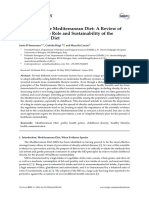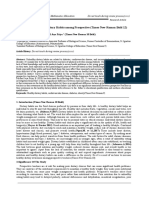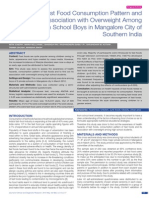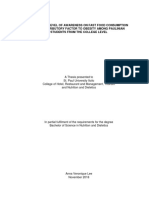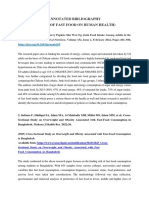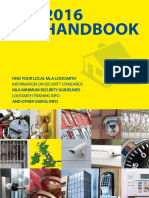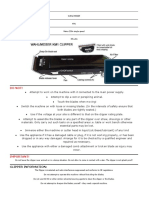0 ratings0% found this document useful (0 votes)
25 viewsTopic: Assesment of Diet in Medical Students of Kims
Topic: Assesment of Diet in Medical Students of Kims
Uploaded by
Nazreen fatmaThis document presents a study protocol to assess the diet and nutritional knowledge of medical students at KIMS. The study will use a cross-sectional design with a sample of 588 medical students who will complete a questionnaire on their regular food habits, health issues, and nutritional knowledge. The objective is to understand nutritional knowledge and the influence of different diet habits on health. The results could help identify weaknesses in knowledge and unhealthy habits to help develop new educational approaches to improve diet and reduce lifestyle diseases.
Copyright:
© All Rights Reserved
Available Formats
Download as PPTX, PDF, TXT or read online from Scribd
Topic: Assesment of Diet in Medical Students of Kims
Topic: Assesment of Diet in Medical Students of Kims
Uploaded by
Nazreen fatma0 ratings0% found this document useful (0 votes)
25 views16 pagesThis document presents a study protocol to assess the diet and nutritional knowledge of medical students at KIMS. The study will use a cross-sectional design with a sample of 588 medical students who will complete a questionnaire on their regular food habits, health issues, and nutritional knowledge. The objective is to understand nutritional knowledge and the influence of different diet habits on health. The results could help identify weaknesses in knowledge and unhealthy habits to help develop new educational approaches to improve diet and reduce lifestyle diseases.
Original Title
final presentation.pptx
Copyright
© © All Rights Reserved
Available Formats
PPTX, PDF, TXT or read online from Scribd
Share this document
Did you find this document useful?
Is this content inappropriate?
This document presents a study protocol to assess the diet and nutritional knowledge of medical students at KIMS. The study will use a cross-sectional design with a sample of 588 medical students who will complete a questionnaire on their regular food habits, health issues, and nutritional knowledge. The objective is to understand nutritional knowledge and the influence of different diet habits on health. The results could help identify weaknesses in knowledge and unhealthy habits to help develop new educational approaches to improve diet and reduce lifestyle diseases.
Copyright:
© All Rights Reserved
Available Formats
Download as PPTX, PDF, TXT or read online from Scribd
Download as pptx, pdf, or txt
0 ratings0% found this document useful (0 votes)
25 views16 pagesTopic: Assesment of Diet in Medical Students of Kims
Topic: Assesment of Diet in Medical Students of Kims
Uploaded by
Nazreen fatmaThis document presents a study protocol to assess the diet and nutritional knowledge of medical students at KIMS. The study will use a cross-sectional design with a sample of 588 medical students who will complete a questionnaire on their regular food habits, health issues, and nutritional knowledge. The objective is to understand nutritional knowledge and the influence of different diet habits on health. The results could help identify weaknesses in knowledge and unhealthy habits to help develop new educational approaches to improve diet and reduce lifestyle diseases.
Copyright:
© All Rights Reserved
Available Formats
Download as PPTX, PDF, TXT or read online from Scribd
Download as pptx, pdf, or txt
You are on page 1of 16
ICMR STS 2019
Topic Assesment of diet in medical students
of KIMS
ID:2019-05669
NAME OF STUDENT: NAZREEN FATMA(2ND YR
2ND TERM)
SIGNATURE:
DEPARTMENT OF PHYSIOLOGYNAME OF GUIDE
:DR MRS. S.S JAGTAP
SIGNATURE:
HEAD OF DEPT: K.C WINGKAR
SIGN:.
Title:
Assessment of diet in
Medical students of
KIMS .
• Introduction:
¤The human body runs on food.Food is
most integral part of our life.
¤What we eat today not only affect our
present but also has a significant impact
on our future health.
¤The prevelence of obesity and
underweight has increased in recent
years due to change in eating habits all
over the world.
Increase of overweight and obesity due
to inappropriate diet and inactive life style
,leads to chronic diseases.
If we neglect healthy eating habits we
not only face a possible future of being
underweight or obese, but also run the risk
of depression , heart diseases, diabetes,
cancer, gastro intestinal complications and
many more.
According to WHO estimation, by the
year 2020,non communicable diseases
will be account for approximate 3/4of
all deaths in developing world.
80% heart diseases,strokes,DM2,
hypertension,40% cancer could be avoided by
diet habit.
As I observed in my surroundings and
among peers that there are huge varieties
of food habits and its related confusions
(e.g Does intermittent fasting is good or bad
for health?Frequent eating boosts or
depresses body metabolism?Many smaller
meals help to loose or gain weight? etc.) so
through this research i will try to clear out
these confusions.
For better health , we should have
knowledge about this so i want to do
this research among medical students
because they are pillar of health.There
knowlegde level guide us that how to
work and where we have to work to
make it better.
Objective:
1.To know Nutritional knowledge
among medical students.
2.Influence of different diet habits on
health.
• Methodology:
Types of study: Health education
Subject area: obesity,Nutrition and
Dietics
Research design: cross-sectional
studyselecting sample: The sample will
be choosen from sampling frame, which
mainly include medical students of
kims.Sample size is 588 medical students
selected through
n=4SD2/(M*€)2.€=0.1
Age range =18 to 25
Mode of data collection:
The data will be collected through a single
survey in medical students of kims.
Data will be collected through
questionnaire.(General Nutritional
Knowledge Questionnaire) The
questionnaire will include the questions
related to their regular food habit, thier
idea about thier habit , age, sex ,weight,
BMI, there health related problems and
Data collection:
The questionnaire would be distributed to
medical students of kims ,after taking their
concent and explaining the purpose of the
study
Method will be explained.
Result will be analysed according to data.
Implication:
¤This survey can be regarded as a step
towards understanding the importance of
developing proper diet habits in order to
bring about a substantial reduction in
sufferings and related life style disorders.
¤This result will point on weak spots in
nutritional knowledge and revealed
unhealthy eating habit in students.
¤This information is necessary for
development of new approaches and
modulate their knowledge and consequent
act on it.
Reference:
1.Nutritional knowledge and dietary habits
survey in high school population: Dragana
Milosavljevic , milena L. Mandic and ines
banjari 2015
2.Paramenter k. wardle j, eur j clin
nutr,53(1999)298.
3.Iranpour A Tehran, Iran: Iran Medical
science University ; 2004. The study of
training effects on knowledge and attitude
of male middle aged students among
nutritional habits in Kerman
4.Glanz K, Brug J, van Assema P. Are awareness of
dietary fat intake and actual fat consumption
associated? ������� A Dutch-American
comparison. Eur J Clin Nutr. 1997;51:542–
7. [PubMed]
5.van Dillen SM, Jan Hiddink G, Koelen MA, de
Graaf C, van Woerkum CM. Exploration of possible
correlates of nutrition awareness and the
relationship with nutrition-related behaviours: results
of a consumer study. Public Health [PubMed]
6.Peykari N, Tehrani FR, Eftekhari MB,
Malekafzali H, Dejman M, Neot R, et al. A
peer-based study on adolescence
nutritional health: A lesson learned from
Iran. J Pak Med Assoc. 2011;61:549–
54. [PubMed]
Milosavljevic D , Mandic ML , Banjari I. et. al.
7.Nutrional knowledge and dietary habit
survey in high school population: coll
Antropol.2015 Mar ; 39 (1): 100-7 [PubMed]
You might also like
- HTML CSS Wordpress Course OverviewDocument6 pagesHTML CSS Wordpress Course OverviewSayma SadiaNo ratings yet
- PS Preparation Outline (050318)Document4 pagesPS Preparation Outline (050318)Zammira RamliNo ratings yet
- B A Final 2Document31 pagesB A Final 2Mohammad ShafiqNo ratings yet
- KULDEEP Synopsis Mad by MeDocument18 pagesKULDEEP Synopsis Mad by MeKuldeep SharmaNo ratings yet
- Reserach New 31-8Document32 pagesReserach New 31-8Mohammad ShafiqNo ratings yet
- DBT y Evaluacion NutricionalDocument7 pagesDBT y Evaluacion NutricionalestesiesundriveNo ratings yet
- The Relationship of Eating Habits, Physical Activities, Food Choises With Obesity Among Students in Public Senior High School MedanDocument4 pagesThe Relationship of Eating Habits, Physical Activities, Food Choises With Obesity Among Students in Public Senior High School MedanDaniella TiansayNo ratings yet
- Dietary Knowledge Among Adults With Type 2 Diabetes-Kingdom of Saudi ArabiaDocument8 pagesDietary Knowledge Among Adults With Type 2 Diabetes-Kingdom of Saudi ArabiaMahmoud HakimNo ratings yet
- Capther Iv: Be As Follow. Obese Students Who Are Studying in Medical FacultyDocument10 pagesCapther Iv: Be As Follow. Obese Students Who Are Studying in Medical FacultyShenbagam MahalingamNo ratings yet
- Práticas Alimentares de Ingressantes Na Universidade Segundo o Guia Alimentar para A População BrasileiraDocument12 pagesPráticas Alimentares de Ingressantes Na Universidade Segundo o Guia Alimentar para A População Brasileiraviviane.sia.ufrjNo ratings yet
- Thesis On Childhood Obesity in IndiaDocument4 pagesThesis On Childhood Obesity in Indiabshpab74100% (2)
- Kes 2021Document7 pagesKes 2021TAHANo ratings yet
- Nutrients 11 01306Document25 pagesNutrients 11 01306dwirizqillahNo ratings yet
- The Association Between Eating Habits and Body MasDocument14 pagesThe Association Between Eating Habits and Body MasAngel GonzagaNo ratings yet
- 54 60 ShivastravaDocument7 pages54 60 ShivastravaRajeev NepalNo ratings yet
- G8 Proposal DefenseDocument15 pagesG8 Proposal DefenseJogil ParaguaNo ratings yet
- Jaliliana Et Al, 2019Document6 pagesJaliliana Et Al, 2019larissa matosNo ratings yet
- DadaOyewoleandDesmennu IQCHENOv162020 0272684x20972895Document12 pagesDadaOyewoleandDesmennu IQCHENOv162020 0272684x20972895Kingsley EsedebeNo ratings yet
- Nutritional Assessment and Its Comparison Between Obese and NonDocument37 pagesNutritional Assessment and Its Comparison Between Obese and NonJaspreet SinghNo ratings yet
- Irc PresentationDocument21 pagesIrc PresentationAnmol VijNo ratings yet
- Business Schools in Pakistan: Name of GroupDocument6 pagesBusiness Schools in Pakistan: Name of GroupNirmal RiaZNo ratings yet
- FDocument8 pagesFEFRI YANTINo ratings yet
- Mini Nutrition Assessment PDFDocument2 pagesMini Nutrition Assessment PDFDiyah RahmawatiNo ratings yet
- The Effect of Dietary Habits To Nutritional Status of Grade 12Document21 pagesThe Effect of Dietary Habits To Nutritional Status of Grade 12Leo Oliver IrincoNo ratings yet
- Research PaperDocument21 pagesResearch PaperKenneth Delegencia GallegoNo ratings yet
- Carbohydrates and Diabetes4Document26 pagesCarbohydrates and Diabetes4Dwight B. PerezNo ratings yet
- Factors contributing to obesity among University StudentsDocument5 pagesFactors contributing to obesity among University Studentstoluo1No ratings yet
- Thigpen Matt CurriculumDocument12 pagesThigpen Matt Curriculumapi-261193383No ratings yet
- EatinghabitsobesityDocument10 pagesEatinghabitsobesityAngel GonzagaNo ratings yet
- The Problem and Its BackgroundDocument37 pagesThe Problem and Its BackgroundKyra MedinaNo ratings yet
- Paper TemplateDocument7 pagesPaper Template202010315095 SANIANo ratings yet
- Studying Eating Habits Among Undergraduates College Student at Minia UniversityDocument24 pagesStudying Eating Habits Among Undergraduates College Student at Minia UniversityÁnh NguyễnNo ratings yet
- Research Paper On Life Style, April 2021Document9 pagesResearch Paper On Life Style, April 2021sheeliya whiteNo ratings yet
- HSB SBA (new one)Document14 pagesHSB SBA (new one)ashwariya268No ratings yet
- Awareness On Healthy Dietary Habits Among Prospective (Times New Roman Bold 12)Document7 pagesAwareness On Healthy Dietary Habits Among Prospective (Times New Roman Bold 12)komputer stieaasNo ratings yet
- Nutritional Assessment of Older Adults With Diabetes MellitusDocument8 pagesNutritional Assessment of Older Adults With Diabetes MellitusCarlo EspadinNo ratings yet
- Weight Management Program 2015Document14 pagesWeight Management Program 2015api-284569489No ratings yet
- Community Health Project Assignment 01068804Document14 pagesCommunity Health Project Assignment 01068804John HortonNo ratings yet
- Fast Food Consumption Pattern and Its Association With Overweight Among High School Boys in Mangalore City of Southern IndiaDocument5 pagesFast Food Consumption Pattern and Its Association With Overweight Among High School Boys in Mangalore City of Southern IndiaAlicia SánchezNo ratings yet
- Awareness of Health Consequences of Junk Foods Among Medical StudentsDocument5 pagesAwareness of Health Consequences of Junk Foods Among Medical Studentsprincesspaypa21No ratings yet
- Effects of Dietary Practices On Nutritional Status of Grade 12 Female FoodDocument26 pagesEffects of Dietary Practices On Nutritional Status of Grade 12 Female FoodLeo Oliver IrincoNo ratings yet
- Chapte 1 2 - Group 5 1Document19 pagesChapte 1 2 - Group 5 1arlenetacla12No ratings yet
- Wa0001.Document5 pagesWa0001.Santhini PrideepNo ratings yet
- ResearchDocument6 pagesResearchDunhill GuanteroNo ratings yet
- TMP ABB8Document10 pagesTMP ABB8FrontiersNo ratings yet
- 40-Article Text-196-1-10-20200130Document5 pages40-Article Text-196-1-10-20200130Sri Novita YandaNo ratings yet
- Pubh480 Documents Interventionsandimplementation Template 779453091Document17 pagesPubh480 Documents Interventionsandimplementation Template 779453091akpanunwana832002No ratings yet
- Literature ReviewDocument8 pagesLiterature Reviewvaibhav1504.vsNo ratings yet
- Habits and Level of Awareness On Fast Food Consumption As A Contributory Factor To Obesity Among Paulinian Students From The College LevelDocument33 pagesHabits and Level of Awareness On Fast Food Consumption As A Contributory Factor To Obesity Among Paulinian Students From The College LevelNana LeeNo ratings yet
- Nutrition Thesis TopicsDocument6 pagesNutrition Thesis Topicsybkpdsgig100% (2)
- Nutritional Status and Age at Menarche On Female Students of Junior High SchoolDocument5 pagesNutritional Status and Age at Menarche On Female Students of Junior High SchoolIndri WahyuniNo ratings yet
- Good Nutrition Thesis TopicsDocument6 pagesGood Nutrition Thesis Topicstonichristensenaurora100% (2)
- Negro Research 1Document28 pagesNegro Research 1josephapple017No ratings yet
- Sand 2019Document9 pagesSand 2019isragelNo ratings yet
- Impact of Fast Food On Human Health (Vanshita Rajput)Document6 pagesImpact of Fast Food On Human Health (Vanshita Rajput)VANSHITA RAJPUTNo ratings yet
- Evaluation of Eating Habits and Their Impact On HeDocument16 pagesEvaluation of Eating Habits and Their Impact On He2023502113No ratings yet
- Evaluation of Knowledge and Self Care Practices in Diabetic Patients and Their Role in Disease ManagementDocument4 pagesEvaluation of Knowledge and Self Care Practices in Diabetic Patients and Their Role in Disease ManagementSharmela BrijmohanNo ratings yet
- Concept Paper SampleDocument3 pagesConcept Paper Samplegedilyn90No ratings yet
- OTH 610 Needs Assessment DraftDocument15 pagesOTH 610 Needs Assessment DraftlehalnavNo ratings yet
- Research Presentations of Dietetic Internship Participants: Research Proceedings - Nutrition and Food SectionFrom EverandResearch Presentations of Dietetic Internship Participants: Research Proceedings - Nutrition and Food SectionNo ratings yet
- Equity in Healthcare: Journal of the Student National Medical Association (JSNMA), #22.1From EverandEquity in Healthcare: Journal of the Student National Medical Association (JSNMA), #22.1No ratings yet
- Nutrition Education: Strategies for Improving Nutrition and Healthy Eating in Individuals and Communities: 92th Nestlé Nutrition Institute Workshop, Lausanne, September 2018From EverandNutrition Education: Strategies for Improving Nutrition and Healthy Eating in Individuals and Communities: 92th Nestlé Nutrition Institute Workshop, Lausanne, September 2018M.M. BlackNo ratings yet
- Master Locksmiths Association 2016 HandbookDocument82 pagesMaster Locksmiths Association 2016 Handbookchieflittlehorse100% (3)
- Chapter - 7 Conclusion and SuggestionsDocument8 pagesChapter - 7 Conclusion and SuggestionsRatanSinghSinghNo ratings yet
- Gut Microbiota in Human Metabolic Health and Disease: Yong Fan and Oluf PedersenDocument17 pagesGut Microbiota in Human Metabolic Health and Disease: Yong Fan and Oluf PedersenEsthéfane DarsNo ratings yet
- Final Interpretation of Data 1Document25 pagesFinal Interpretation of Data 1John Louie CalmaNo ratings yet
- MAXON CINEMA 4D R18 Studio A Tutorial Approach 5th Edition Sham Tickoo All Chapters Instant DownloadDocument65 pagesMAXON CINEMA 4D R18 Studio A Tutorial Approach 5th Edition Sham Tickoo All Chapters Instant Downloaddeylestomagp100% (1)
- Panelinstrument Catalogu0Document36 pagesPanelinstrument Catalogu0Jatupol PongsirisartNo ratings yet
- Agilent GC MS SpecificationDocument5 pagesAgilent GC MS Specificationashif28No ratings yet
- PAC-2008-2009-Recapitulare ETABSDocument2 pagesPAC-2008-2009-Recapitulare ETABSAndrei GheorghicaNo ratings yet
- OA-10-OBJ-AND-STRUCTURE - Customer RelationsDocument13 pagesOA-10-OBJ-AND-STRUCTURE - Customer RelationsMarilou HernandezNo ratings yet
- Apartment Planning Concept in Settlement Area of Sleman DistrictDocument8 pagesApartment Planning Concept in Settlement Area of Sleman DistrictauliaNo ratings yet
- Wahl Km1 Clippers InstructionsDocument4 pagesWahl Km1 Clippers InstructionsScott OldfieldNo ratings yet
- Lanid: User's ManualDocument5 pagesLanid: User's ManualRazvan TeleanuNo ratings yet
- Ca 125 MD E RF: Technical Data SheetDocument3 pagesCa 125 MD E RF: Technical Data Sheet01fe18bme033No ratings yet
- 21aim45a-Dbms Module-2Document70 pages21aim45a-Dbms Module-2pushpanathan0704No ratings yet
- MEGA JOB FAIR at Mangalore On 25 Jan 2020 Organized by Freshersworld PDFDocument43 pagesMEGA JOB FAIR at Mangalore On 25 Jan 2020 Organized by Freshersworld PDFShaik RoshanNo ratings yet
- Full download Energy Efficiency 1st Edition Daniel M. Martinez pdf docxDocument41 pagesFull download Energy Efficiency 1st Edition Daniel M. Martinez pdf docxlabbygrown8x100% (2)
- Method Statement For Hydrostatic Test & Pneumatic Test: Issue Purpose For ConstructionDocument19 pagesMethod Statement For Hydrostatic Test & Pneumatic Test: Issue Purpose For ConstructionHà HuệNo ratings yet
- The Nature of Human LanguageDocument37 pagesThe Nature of Human LanguageWinter BacalsoNo ratings yet
- Method Statements and SATDocument1 pageMethod Statements and SATJohn ArvieNo ratings yet
- 40 Questions To Test Your Skill On R For Data ScienceDocument32 pages40 Questions To Test Your Skill On R For Data ScienceSuman DasNo ratings yet
- Thesis Statement On VanityDocument7 pagesThesis Statement On Vanitysandraahnwashington100% (2)
- Refer To Brand Preference Problem 6.5. A Obtain The Studentized Deleted Residuals and IdentifyDocument7 pagesRefer To Brand Preference Problem 6.5. A Obtain The Studentized Deleted Residuals and IdentifyCharlotteNo ratings yet
- Qap Hot Induction BendsDocument6 pagesQap Hot Induction BendsVidyut UjalaNo ratings yet
- Baseline - Lesson PlanDocument5 pagesBaseline - Lesson Planapi-552123495No ratings yet
- 2019 SHA-2 Code Signing Support Requirement For Windows and WSUSDocument2 pages2019 SHA-2 Code Signing Support Requirement For Windows and WSUSJakub ČížekNo ratings yet
- Kohlberg'S Theory of Moral DevelopmentDocument10 pagesKohlberg'S Theory of Moral Developmentkc osayan100% (1)
- Dokumen - Tips - Caterpillar Cat 14m Motor Grader Prefix b9j Service Repair Manual b9j00001 and UpDocument27 pagesDokumen - Tips - Caterpillar Cat 14m Motor Grader Prefix b9j Service Repair Manual b9j00001 and UpOrrego DanielNo ratings yet
- Harris ScarfDocument6 pagesHarris ScarfHudaNo ratings yet












